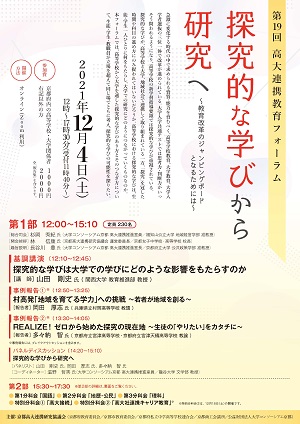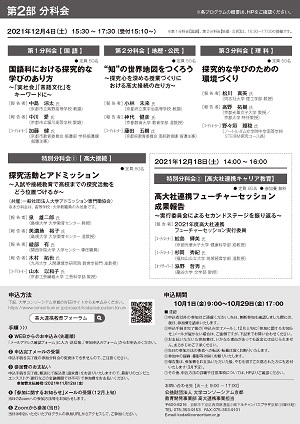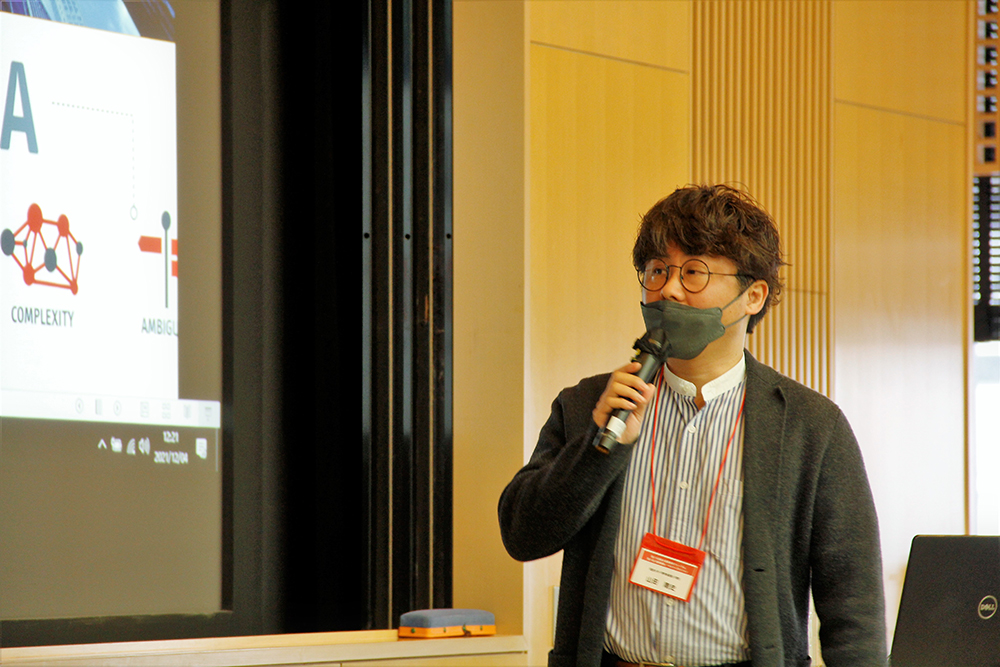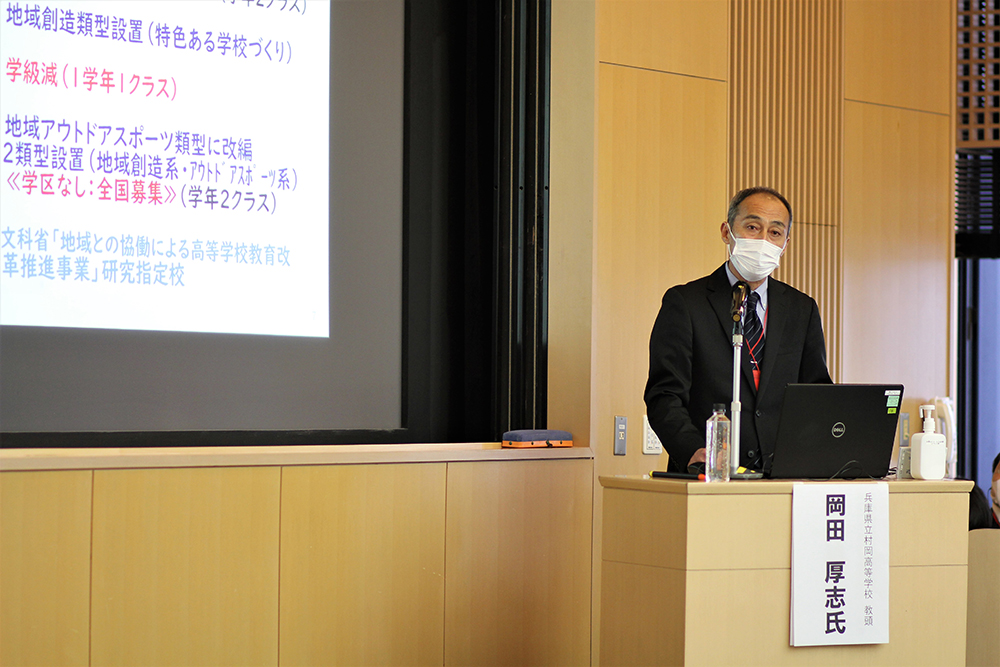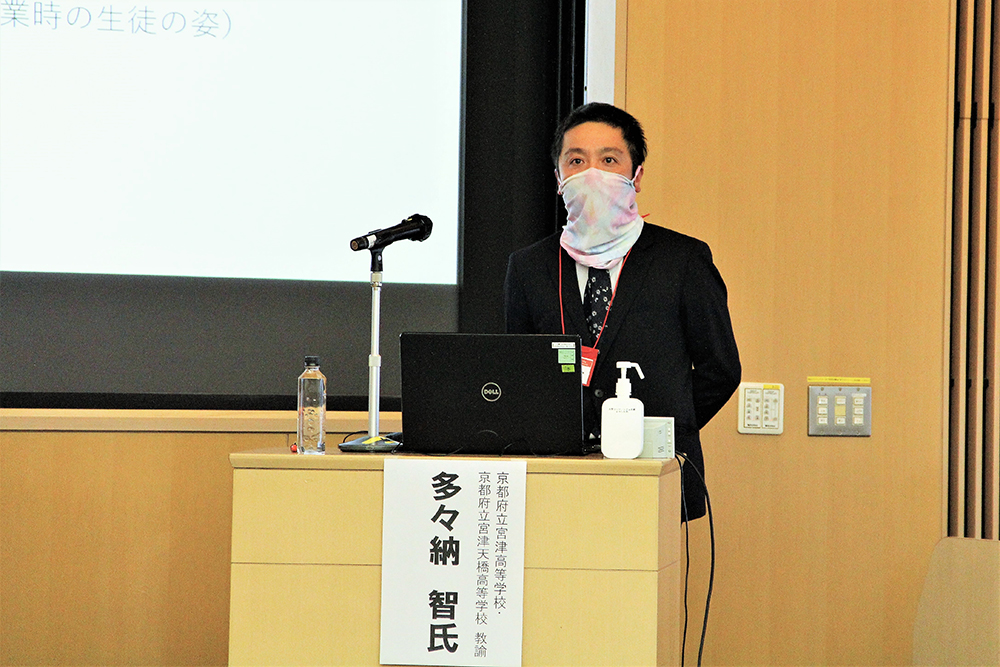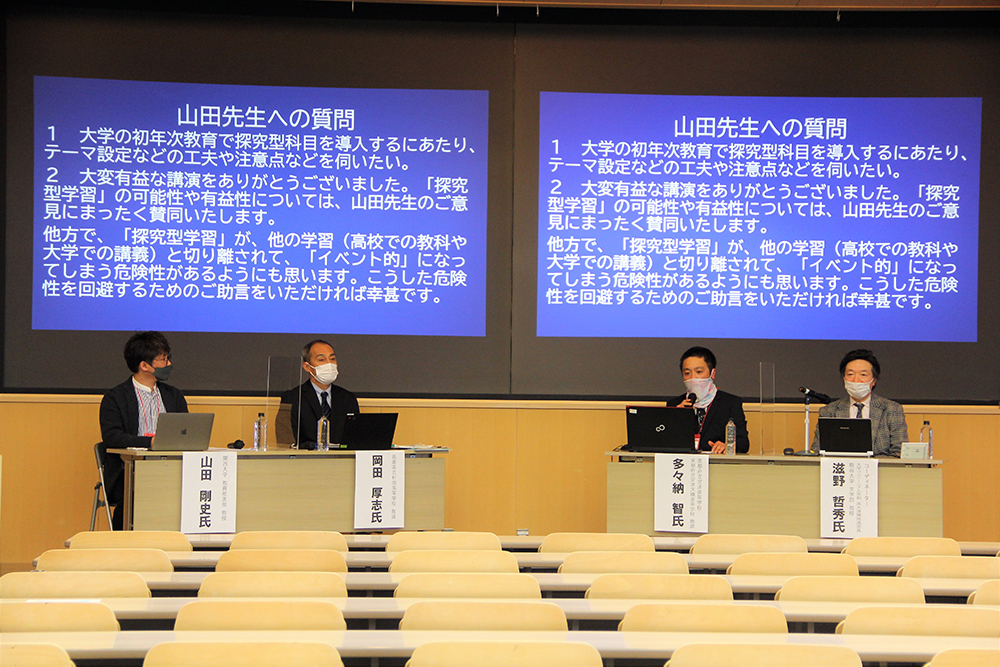Overview of the business
We hold a forum for the purpose of "sharing information on domestic trends and disseminating information on initiatives in Kyoto" on the issue of collaboration and connection education between high schools and universities.
Outline of the event
The 19th High School-University Collaborative Education Forum
* About the system error that occurred on October 1 (Friday)
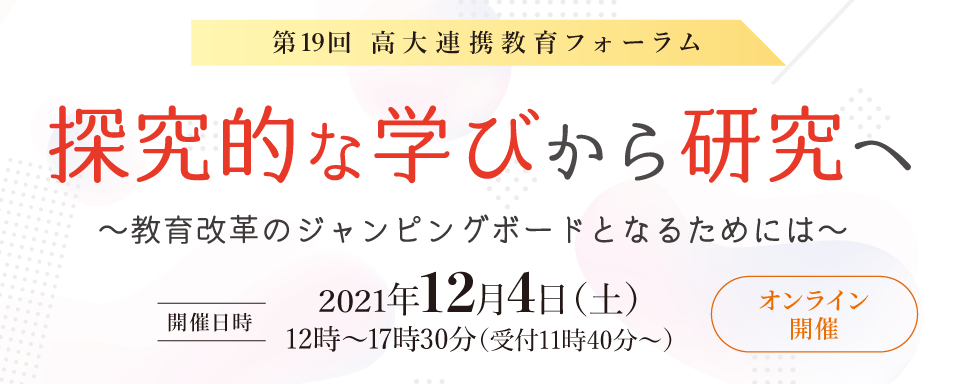
In order to foster the qualities and abilities required in this rapidly changing era, reforms are being promoted in a three-pronged manner: high school education, university education, and university admissions selection. The Common Test for University Admissions has further tested the ability to think and make decisions, and the new course of study for high schools emphasizes inquiry-based learning.
While inquiry-based learning is being tackled in collaboration with high schools, universities, and local communities, is it not limited to the time and way in which subjects are conducted under the title of "inquiry"? What does inquiry-based learning in high school bring to each student and how does it lead to research at university?
In this forum, students, faculty and staff will think together about the ideal form of exploratory learning from high school to university and how to connect it, and explore the possibilities of inquiry-based learning together in the same place.
* In response to the recent spread of the new coronavirus infection, the Kyoto High School Collaborative Research Council is promoting efforts to prevent the spread of infection. In the future, from the viewpoint of preventing the spread of infection, we may change the implementation form of this forum or take measures to cancel it. In that case, we will inform you on this website, etc. Thank you for your understanding.
| Schedule | Saturday, December 4, 2021 | ||
| Venue | Online (via Zoom) | ||
| Theme | From Inquiry-based Learning to Research: Becoming a Jumping Board for Educational Reform |
||
| Capacity (first come, first served) | Part 1 | Keynote Speech, Case Report (1), Case Report (2), Panel Discussion | 230 |
| Part 2 | Subcommittee 1 [Japanese] | 50 people | |
| Subcommittee 2 [Geography and Civics] | 50 people | ||
| Subcommittee 3 [Science] | 50 people | ||
| Special Subcommittee (1) [High School-University Connection] *Only for high school and university faculty and staff |
80 | ||
| Special Subcommittee (2) [High School University Collaboration Career Education] * Held separately on Saturday, December 18 |
90 employees * Increased |
||
| Attendance fee | Includes "Report Collection" for persons other than those listed above related to high schools and universities in Kyoto Prefecture. |
JPY 1,000 2,000
|
|
| Organizer | Kyoto High School Collaborative Research Council (Kyoto Prefectural Board of Education/Kyoto City Board of Education/Kyoto Prefectural Federation of Private Junior and Senior High Schools/Kyoto Chamber of Commerce and Industry/University Consortium Kyoto) | ||
You can download the flyer of the 19th High School-University Collaborative Education Forum from here.
【Part 1】12:00~15:10 Keynote Speech, Case Report (1), Case Report (2), Panel Discussion
General Moderator
: Mr. Hideki Sugioka (Member of the High School-University Collaboration Promotion Office, University Consortium Kyoto / Associate Professor, Faculty of Regional Management, Fukuchiyama Public University) Opening Remarks
Mr. Nobuyasu Hayashi (Chairman, Kyoto High School Collaborative Research Council / Principal, Kyoto Women's Junior and Senior High School)Explanation
of the PurposeMr. Yutaka Hasegawa (Director, High School-University Collaboration Promotion Office, University Consortium Kyoto / Associate Professor, Faculty of Public Policy, Kyoto Prefectural University)
| Keynote Speech 12:10~12:45 |
How does exploratory learning affect university learning?
|
|
| In a social situation that is described as an unpredictable era, society requires school education to develop the ability to identify and solve problems and the agency to go there. At universities, there are increasing opportunities for exploratory learning such as graduation research and thesis, PBL (Problem/Project Based Learning), and service learning. Under such circumstances, how have changes in high school education, especially the experience of inquiry-based learning, affect university learning? I would like to explore this theme with data. | ||
| 12:45~12:50 | Break | |
| Case Report (1)* 12:50~13:25 |
Murataka's Challenge to "Academic Ability to Cultivate Communities" ~Young People Create Communities~
|
|
| At our school, our greatest aim is to develop "academic ability to nurture the community," which means "academic ability to live and work in daily life" and "academic ability with independence and willingness to live." Through the process of practically solving regional issues in collaboration with governments, universities, regional educational institutions, and local residents (the process of community development), we aim to foster "academic ability to nurture the community" and embody it as the qualities and abilities to collaborate and participate in regional revitalization, and to develop future-oriented people who love "the region" and acquire "the academic ability to nurture the community". | ||
| 13:25~13:30 | Break | |
| Case Report (2)* 13:30~14:05 |
REALIZE! The current location of exploration that started from scratch ~ Giving shape to the student's "what they want to do" ~
|
|
| With the aim of becoming aware of social issues and realizing independent career development, our school introduced inquiry activities for all students of the regular course from 2018. The project team formed before the introduction visited other schools and researched teaching materials, and through the workshop, all faculty and staff members were united in their opinions. In 2015, he established the Field Exploration Club (now the Club) to create a role model for regional exploration. The results are returned to a time of comprehensive inquiry, and we aim to explore with a rich regional flavor while emphasizing interests. | ||
| 14:05~14:20 | Break | |
| Panel Discussion 14:20~15:10 |
From exploratory learning to research
|
|
* Case reports include breakout sessions.
【Part 2】15:30~17:30 Breakout Session
*Subcommittee 1 [Japanese] and Session 2 [Geography and Civics] will be held from 15:30~17:00.
| Subcommittee 1 [Japanese] |
Inquiry Learning in Japanese Language ~With the keywords of "real society" and "language and culture"~
|
|
| Based on class practice reports from high schools, students will consider the future of learning in order to achieve the goals of the Japanese language department in the new Course of Study, such as the ability to "speak the Japanese language necessary for lifelong social life" and the qualities and abilities to become "bearers of Japanese language and culture," and how to connect it to university learning. | ||
| Subcommittee 2 [Geography and Civics] |
Let's create a world map of "knowledge" ~How to connect high school and university in creating lessons that deepen the inquiring mind~
|
|
| As part of Kyoto University of Education's "Global Studies," we will report on the practice of high school ethics classes created by high school teachers and university teachers from a new perspective, centering on the exploration of values in the age of globalization. Through this report, we will consider the ideal form of classroom practice and inquiry activities that lead from high school research to university research. * Mr. Jindai's report will be delivered on video. |
||
| Subcommittee 3 [Science] |
Creating an environment conducive to exploratory learning
|
|
| How can female students develop interest in the fields of science through inquiry-based learning? Notre Dame Jogakuin Junior and Senior High School will report on the practice of the inquiry course, and from the university's perspective, Doshisha University and Kyoto Koka Women's University, which are participating in the "Program to Support Female Junior and Senior High School Students to Choose a Career in the Sciences" of the Japan Science and Technology Agency, will report. | ||
| Special Subcommittee (1) [High School-University Connection] |
Inquiry Activities and Admissions ~How to Position Inquiry Activities Up to High School in Entrance Examinations and Connected Education~ (Co-organizer: Association of University Admission Professionals)
|
|
| We will report on how the experience of research activities up to high school affects high school students' university entrance examination activities, treatment in entrance examinations, and learning status after enrollment. Next, we will discuss with the participants the impact of high school research activities on entrance examination behavior and the entrance examination system, and share future possibilities and challenges. *This subcommittee is only for high school and university faculty members. |
||
Saturday, December 18, 2021 14:00~16:00 *Participation fee is free
| Special Subcommittee (2) [Career Education in Collaboration with High School-University Companies] |
Report on the results of the High School-University Collaboration Future Session ~Looking back on the second stage by the executive committee~
|
|
| As values and social conditions change significantly due to the impact of the new coronavirus infection, the diversity of ways of learning, working, and living is expanding. Based on this, we planned this year's high school university collaboration future session in the form of an executive committee composed of high school and university students, as in the previous year. In this subcommittee, we will report on the results of the second stage of the executive committee. * The "High School-University Collaboration Future Session" is a career-education program for high school and university students that transcends generational and school differences and provides future-oriented dialogue and exchange. |
||
Application
The web application period has ended.
For inquiries regarding participation, please contact the E-mail:kodai@consortium.or.jp/TEL:075-353-9153 in charge of
the High School-University Collaborative Education Forum.
Step 1
Please register your email address from the "Apply" button below.
Step 2
Access the "Application Form" URL sent to your registered email address, follow the on-screen instructions, and receive the "Application Completion Email".
Step 3
Please pay the participation fee at the convenience store by Friday, November 12, 2021 on the payment slip (invoice) sent by mail.
* In principle, we do not issue receipts. If you need a receipt, please contact us at:
Step 4
In early December, please receive a "Notice of Participation" sent to your registered email address. We will inform you how to participate in Zoom on the day.
Step 5
On the day of the forum, please join Zoom by accessing the application program participation URL described in the "Notice of Participation" email.
* To participate in the breakout session, please prepare a camera and microphone.
Application period: October 1, 2021 (Fri) 9:00 ~ October 29, 2021 (Fri) 17:00
【Please be sure to check the information】
(1) If you do not receive the "Application Completion Email" or "Notice of Participation" email, please contact the following.
(2) The participation fee paid cannot be refunded for any reason. Thank you for your understanding.
(3) We will not be able to respond to applications on the day of the event or changes to participating subcommittees.
(4) It is strictly prohibited to forward or reprint received e-mails to others.
(5) Except for proxy participation, participation by anyone other than the applicant will be charged a participation fee at a later date.
* If you do not set the cookies of your browser to "Enabled", you may not be able to apply.
Implementation Report
▶ The 19th High School-University Collaborative Education Forum Report Collection [Click here for details]
This year's event was held under the overall theme of "From Exploratory Learning to Research: Becoming a Jumping Board for Educational Reform." Continuing from last year, from the viewpoint of preventing the spread of new coronavirus infections, the event was held online using Zoom, and 144 people from all over Japan participated.
In the keynote speech in Part 1, Professor Takeshi Yamada, Department of Education Promotion, Kansai University, gave a lecture titled "How does exploratory learning affect learning at university?" As case reports, Mr. Atsushi Okada, Vice Principal of Hyogo Prefectural Muraoka High School, and Mr. Satoshi Tanano, Teacher of Kyoto Prefectural Miyazu High School and Kyoto Prefectural Miyazu Amabashi High School, reported on the case of their own school.
In the panel discussion, under the theme of "From Exploratory Learning to Research," the speakers answered questions from the participants in the keynote speeches and case reports, and discussed with the thoughts of both high school and university.
In the second subcommittee, in addition to the three subjects of "Japanese language," "geohistory and civics," and "science," four subcommittees were held as a special subcommittee (1), including "High School-University Connection," and examples of initiatives were shared and reports were made on each theme.
In addition, on Saturday, December 18, "High School-University Collaboration Career Education" was held as a special subcommittee (2), and it was held as a report meeting and review meeting of the executive committee of the "High School-University Collaboration Future Session" career education program of this association. Through the group work and question-and-answer session by the executive committee members of high school and university students, the participants were able to get a sense of the growth and learning of the students and the opportunity to think about new prospects for high school-university connectivity.
Contact information
Kyoto High School-University Collaborative Research Council Secretariat
(in charge of high school-university collaborative projects, Education Development Division, University Consortium Kyoto) TEL 075-353-9153 FAX 075-353-9101
〒600-8216 Campus Plaza Kyoto
, Shimogyo-ku, Kyoto *Reception hours: Tuesday ~ Saturday 9:00~17:00 (excluding year-end and New Year holidays)













